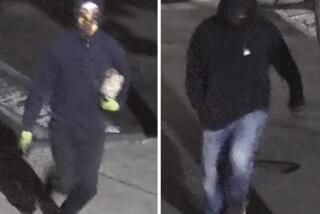Former University of Texas student gets 10 years in prison for aiding terrorists
- Share via
AUSTIN, Texas More than a year after he pleaded guilty to a charge of aiding overseas terrorists, Rahatul Ashikim Khan, a former University of Texas student, was sentenced Friday to 10 years in prison.
Khan, 24, became the second of two young men convicted in Austin of the rare federal offense after admitting he connected an undercover agent with co-conspirators recruiting jihadi fighters to Somalia. His plea in July followed that of Michael Todd Wolfe, a Houston native, who confessed he had plans to travel to Syria to engage in jihad himself.
In a two-hour hearing Friday that revealed the ties between the two cases, U.S. District Judge Sam Sparks said that although Khan, of Round Rock, had pulled out of a plan to travel overseas and had cooperated fully with the government, he had been a “cog in a well-greased machine” that recruited others to pursue violent paths around the world.
Among those caught in Khan’s network, which also included defendants in San Antonio and Miami, had been 24-year-old Wolfe, who was sentenced in June to nearly seven years in prison.
“It was your mind that had you convinced that some of the evil in the world from your perspective could be eliminated,” Sparks said of the motivations behind Khan’s actions.
Both Khan and Wolfe had faced up to 15 years of incarceration.
Outside the courtroom Friday, prosecutors and FBI law enforcement officials hailed the investigations that netted both men, pointing to a recent phenomenon of young Americans and Europeans lured often through online channels into joining terrorist groups, such as the Islamic State, an al-Qaida offshoot that has become one of the main forces fighting government forces in Syria and Iraq.
“This is not an isolated example,” FBI supervisory Special Agent Jason Cromartie said of Khan’s case. “Our families, our friends, our neighbors can be protected before they are lost or killed. Everybody has the potential and the capability to do something about this. If you see something, say something.”
In the courtroom, prosecutor Gregg Sofer painted Khan as a young man who “spread seeds of hate and violence” to younger, less-educated and disenfranchised youths. Authorities said he had been using a chat room through the website Authentic Tauheed as a platform to spot and assess potential recruits to wage jihad overseas.
A separate indictment out of a Miami federal court obtained by the Austin American-Statesman alleged that his co-conspirators had been supporting three groups designated by the United States as foreign terrorist organizations that have operated in Iraq, Syria and Somalia.
But Khan’s defense lawyer, Joe Turner, argued during the sentencing hearing that there was “a distinction between catching a terrorist and creating a terrorist.” In this case, “they tried to create a criminal, but they didn’t,” Turner said.
At the time of the incident, Khan had been a vulnerable and impressionable 19-year-old who was intellectually curious and concerned with a humanitarian crisis abroad, Turner said. His friends and family members described him as a peace-loving and promising government major who aspired to be a lawyer and raise children.
He had no previous criminal history.
Standing before the judge, Khan said he became involved with the wrong people, who twisted his faith and led him to believe “it was my duty to act.” But Khan said he owned up to his mistakes.
“I want to guarantee to you that this is the first time and the last time you will see me before you or any other judge,” he said.
(c)2015 Austin American-Statesman, Texas
Visit Austin American-Statesman, Texas at www.statesman.com
Distributed by Tribune Content Agency, LLC.
More to Read
Sign up for Essential California
The most important California stories and recommendations in your inbox every morning.
You may occasionally receive promotional content from the Los Angeles Times.













